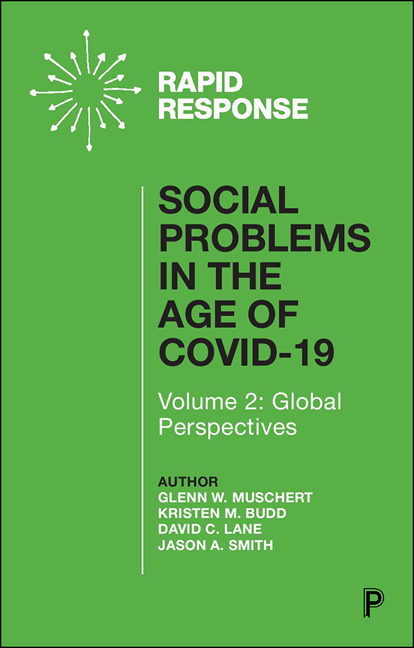Book contents
- Frontmatter
- Contents
- Acknowledgments
- Presidential Welcome
- Editorial Introduction
- 1 Isolation, Economic Desperation, and Exploitation: Human Trafficking and the COVID-19 Crisis
- 2 Uncertainty and Disruption in the Transition to Adulthood During COVID-19
- 3 Disability Rights and Healthcare Rationing during COVID-19
- 4 Social-Distancing the Settler-State: Indigenous Peoples in the Age of COVID-19
- 5 The Pandemic and the Invisible Poor of the Global South: Slum Dwellers in Mumbai, India and Dhaka, Bangladesh
- 6 The Human Right to Water and Sanitation in the Age of COVID-19
- 7 Pandemic Perils of Migrant Workers: Inequalities Intensified
- 8 Food Insecurity and COVID-19
- 9 Protecting Refugee Health and Human Rights in the Context of the COVID-19 Pandemic: Challenges and Pathways to Justice
- 10 COVID-19 Requires an Intersectional Feminist Policy Response
- End Matter
- Afterword
- Index
2 - Uncertainty and Disruption in the Transition to Adulthood During COVID-19
Published online by Cambridge University Press: 23 March 2021
- Frontmatter
- Contents
- Acknowledgments
- Presidential Welcome
- Editorial Introduction
- 1 Isolation, Economic Desperation, and Exploitation: Human Trafficking and the COVID-19 Crisis
- 2 Uncertainty and Disruption in the Transition to Adulthood During COVID-19
- 3 Disability Rights and Healthcare Rationing during COVID-19
- 4 Social-Distancing the Settler-State: Indigenous Peoples in the Age of COVID-19
- 5 The Pandemic and the Invisible Poor of the Global South: Slum Dwellers in Mumbai, India and Dhaka, Bangladesh
- 6 The Human Right to Water and Sanitation in the Age of COVID-19
- 7 Pandemic Perils of Migrant Workers: Inequalities Intensified
- 8 Food Insecurity and COVID-19
- 9 Protecting Refugee Health and Human Rights in the Context of the COVID-19 Pandemic: Challenges and Pathways to Justice
- 10 COVID-19 Requires an Intersectional Feminist Policy Response
- End Matter
- Afterword
- Index
Summary
The Problem
The COVID-19 pandemic has jeopardized the successful transition to adulthood for many youth around the world. The present health and economic crisis has diminished youth's capacity to acquire key adult markers, including finishing school, the acquisition of stable employment, obtaining an independent residence, marriage, and parenthood. Due to significant and widespread disruptions stemming from the pandemic, youth have become increasingly vulnerable at a critical life stage. Inequalities in the transition to adulthood, already problematic before the pandemic, have deepened. However, the impacts of COVID-19 on youth are not uniform across countries; they depend largely on national institutional arrangements and social policy. This chapter addresses the implications of COVID-19 and its aftermath for educational, employment, and family-related transitions to adulthood.
The economic downturn and uncertainty induced by the pandemic have resulted in wide-ranging effects on postsecondary education and training, from the availability of public funding for these programs to their affordability. Unemployment and reductions in work hours have lessened families’ capacity to pay for their children's tuition and other educational costs. Moreover, in some countries, for the first time in the history of higher education, attendance may be a health risk that could discourage enrollment and completion. In this context, youth may lower their educational aspirations, have increasing difficulty obtaining postsecondary educational degrees, and/or drop out due to lack of resources. These problems could exacerbate preexisting racial and class inequalities in educational outcomes, leading to increasingly divergent socioeconomic opportunities both within and between countries.
Similarly, the COVID-19 pandemic has jeopardized young people's successful entry to, and establishment in, the workforce. Long-term structural changes and increased global competition have made work uncertain and unstable, especially for young adults entering the job market. The pandemic has worsened this problem and is likely to widen occupational and income inequalities. The lack of institutional bridges from school to work in some countries, such as the United States, China, and Brazil, makes job entry particularly challenging, even in good economic times. As labor markets tighten in such countries during this pandemic, youth have experienced mounting unemployment from which they will struggle to fully recover even when economic conditions improve.
- Type
- Chapter
- Information
- Social Problems in the Age of COVID-19 Vol 2Volume 2: Global Perspectives, pp. 15 - 26Publisher: Bristol University PressPrint publication year: 2020
- 2
- Cited by



